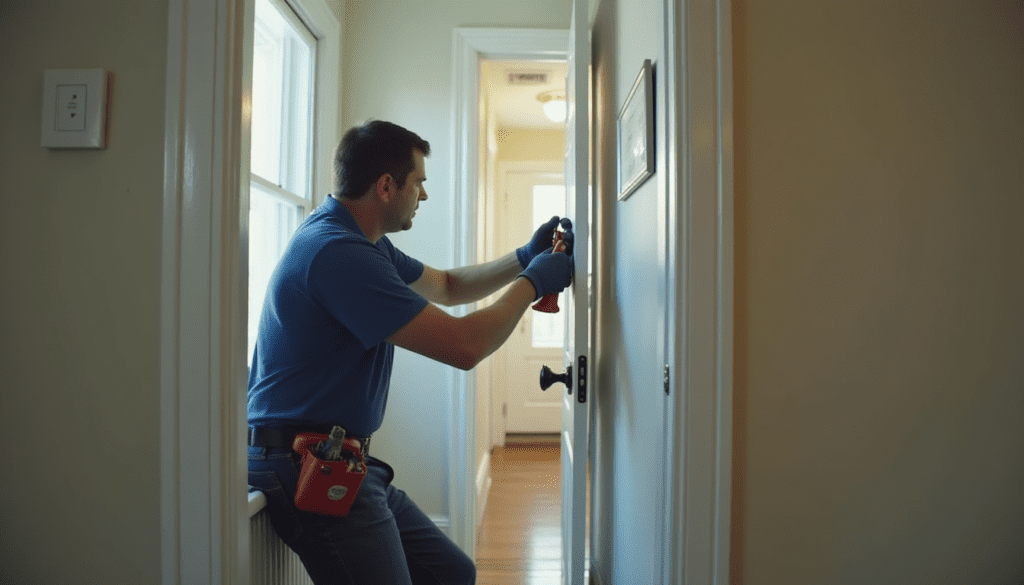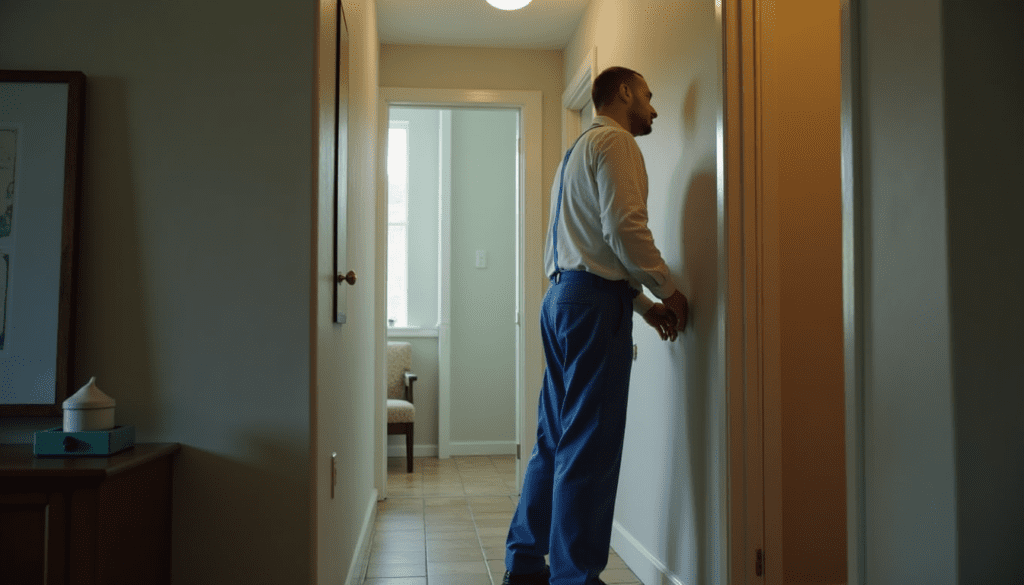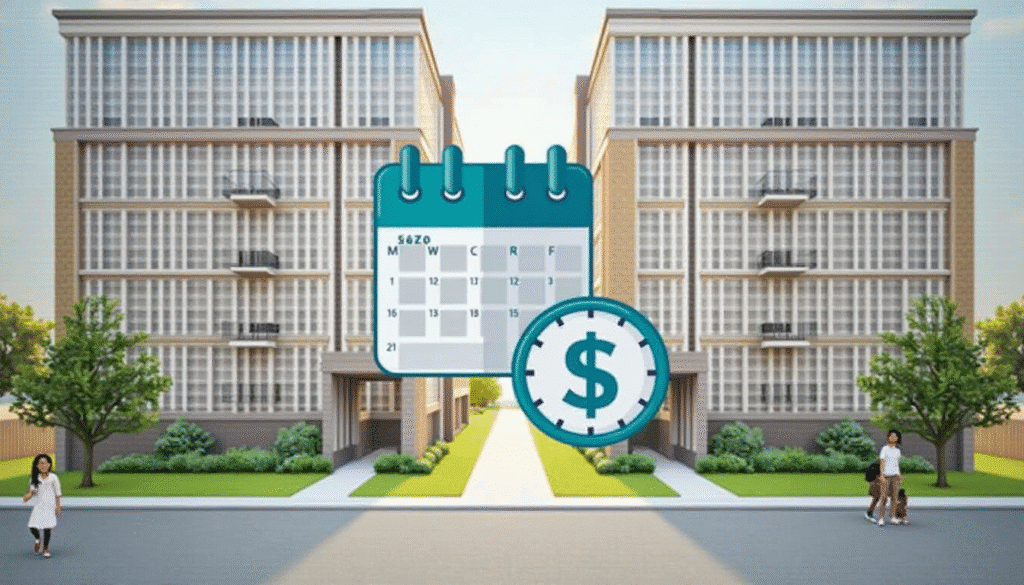Late rent fees are a common source of tension between landlords and tenants, especially in communities like Garfield, NJ where rental housing plays a major role in the local market. While landlords want to encourage on-time payments to keep their cash flow steady, tenants have legal protections that prevent excessive or unreasonable charges. Striking the right balance is key: a fee that is too high could be deemed unenforceable in court, while one that is too low may fail to discourage late payments. In this guide, we’ll explore what New Jersey law says about late rent fees, how Garfield landlords typically structure them, and what’s considered fair and enforceable under state regulations.
Whether you’re a new landlord setting up your first lease, or an experienced property owner reviewing your rent collection policy, understanding how to set late fees properly can protect both your income and your relationship with tenants. Let’s break down the rules and best practices for setting reasonable late rent fees in Garfield, NJ.
Understanding New Jersey Late Rent Laws
Before deciding on a late fee structure in Garfield, every landlord needs to start with New Jersey law. State statutes set certain requirements and protections that apply across all municipalities. For instance, under NJ Revised Statutes § 2A:42-6.1, landlords must give tenants a mandatory grace period before they can charge any late fee. This grace period typically runs for five days, giving tenants until the sixth day after rent is due to make payment without penalty.
Another important aspect of New Jersey law is the protection for certain tenants such as seniors receiving Social Security or other federal benefits. In these cases, the grace period may be extended even further. These rules prevent landlords from immediately penalizing tenants who may rely on fixed monthly income schedules.
While New Jersey does not set a specific maximum percentage or dollar amount for late fees, courts have consistently ruled that the charge must be “reasonable.” According to landlord-tenant resources like Innago’s NJ Landlord-Tenant Laws Guide, fees above 5% of monthly rent often draw scrutiny and may be struck down if challenged in court. This is why it’s important to set late fees within industry norms and local practices rather than picking arbitrary amounts.
NJ Revised Statutes § 2A:42-6.1 – Grace Period Requirements
The five-day grace period is the cornerstone of New Jersey rent collection law. This requirement applies across the state, including Garfield, and ensures that tenants are not unfairly penalized for payments that may arrive a few days late due to weekends, holidays, or delays in processing. Landlords should make sure their lease agreements explicitly reference this grace period to avoid disputes later.
Is There a Legal Cap on Late Fees in NJ?
Unlike some states that impose exact caps (such as “no more than 5% of monthly rent”), New Jersey law does not provide a hard ceiling. However, guidance from landlord associations and property management platforms suggests that fees exceeding 5% may be considered excessive. This is where “reasonableness” becomes the standard: the fee should compensate the landlord for the administrative burden of late payments, not serve as a punishment.
For Garfield landlords, this typically means setting a flat fee (for example, $50 on a $1,000 monthly rent) or a small percentage of the monthly rent, whichever is more appropriate given the lease terms.
Local Practices in Garfield: What Landlords Do
While New Jersey law sets the baseline, Garfield landlords also follow local norms and practices. According to the Garfield Housing Authority Rent Collection Policy, rent is considered late after the fifth day of the month, aligning with state law. After this point, late fees are applied, typically as a percentage of the monthly rent or a flat fee capped at a certain dollar amount.
Private landlords in Garfield often mirror these standards. Many include a clause in their lease specifying a late fee between $25–$75, or up to 5% of monthly rent. This approach helps them remain competitive in the rental market while also ensuring compliance with state laws. Importantly, the fee must be written into the lease agreement to be enforceable—oral agreements or vague terms usually do not hold up in court.
Examples from Garfield Housing Authority Policy
The Garfield Housing Authority provides a clear example of how late fees should be structured in compliance with state law. Their policy enforces rent due on the first of the month, a five-day grace period, and the application of a late fee if payment is not received by the sixth day. This aligns with state law and provides a model for private landlords in the area.
Common Late Fee Percentages & Flat Fees in Garfield Leases
Across Garfield, landlords typically adopt one of two late fee structures:
- Flat Fee: A single charge, often $50–$75, applied once when rent is late.
- Percentage Fee: A fee equal to 3%–5% of monthly rent, which scales depending on the unit’s rent amount.
For example, a $1,500 monthly rent might carry a late fee of $50 (flat) or $75 (5%). Both approaches are common, but landlords should avoid stacking these fees or adding daily penalties, as those are more likely to be deemed excessive or unfair in court.
What’s “Reasonable”: Factors to Consider
The key question for Garfield landlords is: what counts as “reasonable” under New Jersey law? Courts use several factors to determine whether a fee is fair, and landlords should consider the same criteria when drafting lease agreements. This includes:
Amount of Rent vs Late Fee Percentage
The late fee should reflect the actual cost of processing late payments and any disruptions caused to the landlord. A $100 fee on a $600 apartment may be deemed excessive, whereas the same fee on a $2,500 unit might be more defensible.
Duration of Grace Periods
A grace period shorter than the legally required five days is automatically unenforceable in NJ. Many landlords choose to extend the period slightly, such as seven days, to provide flexibility and reduce disputes with tenants.
Frequency: One-Time vs Recurring Late Fees
Charging a one-time fee after the grace period is considered reasonable. Adding recurring daily fees (for example, $10 per day until rent is paid) may be challenged in court, especially if they quickly exceed the 5% threshold. Most Garfield landlords avoid this practice and instead stick to a single, flat charge.
Lease Provisions: How to Properly Write Late Fee Terms
Even if a late fee is reasonable, it must be properly documented in the lease to be enforceable. Vague or poorly written clauses can leave landlords exposed to legal challenges. According to resources like Innago’s New Jersey Guide, the best practice is to clearly state:
- The date rent is due each month.
- The exact length of the grace period (minimum of 5 days in NJ).
- The amount of the late fee, whether a flat charge or percentage.
- A statement that the late fee is applied once after the grace period expires.
Including in Lease: Terms, Definitions, Penalties vs Charges
It is important to distinguish between a “late fee” and a “penalty.” New Jersey law disfavors penalties and will strike them down if challenged. A properly worded clause should present the charge as a fee that compensates the landlord for administrative inconvenience, not as punishment. For example: “Tenant agrees to pay a late fee of $50 if rent is not received by the sixth day of the month.”
Clarity & Transparency with Tenants
Clear communication prevents disputes. When tenants understand exactly how and when late fees are applied, they are less likely to challenge them later. Providing tenants with a written lease agreement, reminders, and receipts for late payments helps maintain transparency and professionalism.
Tenant Rights & Protections in NJ
Late rent fees must always be viewed through the lens of tenant protections. In New Jersey, tenants have strong rights that prevent landlords from overcharging or applying fees in ways that courts would consider punitive. Understanding these protections is critical for Garfield landlords who want their policies to hold up legally and avoid disputes.
Tenants cannot waive certain protections, even if they sign a lease that attempts to do so. For example, a lease cannot legally shorten the five-day grace period guaranteed by NJ Revised Statutes § 2A:42-6.1. Similarly, landlords cannot impose daily compounding fees that cause the tenant’s total charges to balloon far beyond what is reasonable. Courts in NJ consistently strike down such clauses when they are challenged.
Senior Citizen Grace Periods
New Jersey law provides extended grace periods for certain tenants, particularly senior citizens and those receiving federal benefits. According to Innago’s NJ Tenant Rights Guide, seniors may receive up to five business days after their usual income payment date to pay rent before late fees can apply. This ensures that fixed-income residents are not unfairly penalized simply because benefit checks arrive after the standard due date.
In Garfield, where many residents fall into this protected category, landlords must carefully document these provisions in their leases to remain compliant. Ignoring them can result in legal complaints and financial penalties.
What Courts Consider “Unreasonable” Late Fees
According to Landlord Studio’s state-by-state guide, New Jersey courts generally consider late fees above 5% of monthly rent as potentially unreasonable. Additionally, fees that continue to stack each day are often struck down, especially if the accumulated amount significantly exceeds the landlord’s actual administrative costs. A reasonable late fee is one that reflects the inconvenience and cost of delayed rent collection—nothing more.
Case Studies / Sample Calculations for Garfield & NJ
To give landlords in Garfield a clearer picture of what is considered reasonable, let’s look at some sample calculations based on common rental amounts in the city. These examples show how different fee structures play out in practice and where the line of “reasonableness” usually falls.
Example: 5% Late Fee on $1,500 Rent with 5-Day Grace Period
If a tenant pays $1,500 in rent each month and the landlord charges a 5% late fee after the grace period, the total late fee would equal $75. Most New Jersey courts consider this within the reasonable range, since it represents administrative inconvenience but does not create an undue financial burden. This type of fee structure is common in Garfield leases.
Flat Fee vs Percentage Fee Comparison
Another common approach is the use of a flat late fee. For example, a landlord might charge a $50 fee regardless of whether rent is $800 or $2,000. While this method is simple, it can sometimes disadvantage tenants in lower-rent units. By contrast, a percentage-based fee adjusts to the rental amount, which many courts view as more equitable.
For Garfield landlords managing multiple properties with varied rent levels, using a percentage-based model may be the fairest and most legally defensible choice.
Common Mistakes Landlords Should Avoid
Even well-intentioned landlords in Garfield can make errors when drafting or enforcing late rent fees. These mistakes often lead to disputes, unenforceable clauses, or even legal penalties. By understanding what not to do, property owners can protect themselves while maintaining professional tenant relationships.
Using Late Fees as Punishment vs Compensation
A late fee is meant to cover the administrative inconvenience of processing late rent—not to punish tenants. Courts in New Jersey frown upon punitive late fees, especially if they appear excessive or are designed as a deterrent rather than cost recovery. A lease that includes a $200 fee on a $900 rental unit, for example, is far more likely to be invalidated than one that charges $45 or $50.
Not Disclosing Late Fees Clearly in Lease
Another common mistake is failing to disclose late fees in writing. According to Innago’s NJ lease drafting recommendations, a late fee cannot be enforced unless it is explicitly stated in the signed lease agreement. Vague language such as “tenant may be subject to additional charges” is not sufficient. Instead, landlords should spell out the exact fee, grace period, and application terms.
Best Practices for Enforcing Late Rent Fees in Garfield NJ
Once the lease includes a fair and legally compliant late fee, enforcement becomes the next step. Garfield landlords should adopt professional practices that make rent collection smooth and defensible if challenged. Transparency, documentation, and communication are key to preventing disputes.
Communicating in Advance & Written Notices
Tenants are less likely to challenge late fees when they receive consistent communication. This includes clear lease language, monthly rent reminders, and written late notices when fees are applied. A professional, non-confrontational approach reduces tension and builds trust, even when enforcing late fees.
Documentation & Legal Compliance
Every late fee charged should be properly documented. Landlords in Garfield should maintain copies of late notices, receipts, and communication logs. This documentation protects landlords if disputes escalate to court and demonstrates that their late fee policy is enforced consistently and fairly.
Alternatives & Incentives to Late Fee Penalties
While late fees are the most common way to address delayed rent payments, Garfield landlords can also consider alternatives that encourage timely payments without relying solely on penalties. These strategies can build stronger tenant relationships, reduce conflict, and even increase on-time payments over the long term.
Late Fee Waivers / Leniency Periods
Some landlords offer a “one-time waiver” policy, allowing tenants to miss a payment deadline once per year without incurring a late fee. This demonstrates fairness and flexibility while still maintaining structure for repeat offenders. For example, a tenant facing unexpected medical bills or delays in income may deeply appreciate this approach, and it can help reduce turnover by fostering goodwill.
However, Garfield landlords should make sure these policies are applied consistently and documented in writing. Arbitrary or selective waivers could create misunderstandings or claims of unfair treatment.
Incentives for On-Time Rent Payments
Another effective alternative is providing rewards rather than penalties. For example, landlords might offer a $25 rent discount if payment is received before the first of the month. Others include “on-time payment bonuses” that accumulate as credit toward lease renewal fees or annual rent increases. While this requires careful budgeting, incentives can transform rent collection into a positive interaction instead of a punitive one.
Summary & Recommendations for Garfield Landlords
Setting late rent fees in Garfield, NJ requires balancing state legal requirements with local rental market practices. The key takeaways for landlords include:
- Follow New Jersey Law: Always provide the five-day grace period under NJ Revised Statutes § 2A:42-6.1.
- Stay Reasonable: Courts generally view late fees above 5% of monthly rent as excessive.
- Be Clear in Leases: Clearly outline fee amounts, grace periods, and application terms in the lease.
- Respect Tenant Protections: Seniors and benefit recipients often have additional grace periods under state law.
- Document & Communicate: Written notices, receipts, and consistent enforcement protect landlords if disputes arise.
- Consider Alternatives: Offering incentives or one-time waivers can reduce conflict and increase long-term tenant satisfaction.
By following these practices, landlords can set late rent fees that are fair, enforceable, and aligned with both state law and Garfield rental market standards. Ultimately, this balance protects income while maintaining strong tenant relationships.
Frequently Asked Questions (FAQ)
What is a reasonable late fee for rent in New Jersey?
While there is no fixed cap, most experts recommend keeping fees at or below 5% of monthly rent. For example, on a $1,500 apartment in Garfield, a $50–$75 fee would typically be considered reasonable.
Does New Jersey law cap late rent fees?
No. The state does not set an exact maximum but does require fees to be “reasonable.” Courts may strike down late fees that appear excessive or punitive.
How many grace days am I required to give tenants in Garfield NJ?
Landlords must provide a minimum of five days as a grace period before applying any late fees, as required by NJ law.
Can a landlord charge late fees every day in NJ?
Daily compounding fees are risky and often struck down by courts. Most Garfield landlords use a one-time fee after the grace period.
What happens if a late fee is more than 5% of monthly rent in NJ?
If challenged, a court may consider such a fee excessive and unenforceable. Landlords should keep fees modest and well-documented.
Are senior citizens given special grace periods in NJ?
Yes. Seniors and certain tenants receiving federal benefits may qualify for extended grace periods, as noted by Innago.
How should the lease specify late rent fees in Garfield NJ?
The lease should include exact terms: due date, grace period, late fee amount (flat or percentage), and a clear statement that the fee is applied once after the grace period expires.
Next Steps for Garfield Landlords
Late rent fees are not just about collecting payments—they’re about compliance, fairness, and maintaining professional landlord-tenant relationships. By setting policies that align with New Jersey law and Garfield practices, landlords can avoid disputes and protect their rental income.
If you’re unsure whether your current lease agreements are compliant, it may be time to review and update them. Check out our guide on managing tenants who consistently pay rent late in Garfield NJ for additional insights, or contact RentShield Property Management for a professional lease review.
Ready to update your late rent fee policy? Contact us today for a consultation and ensure your leases remain fair, enforceable, and aligned with New Jersey law.






